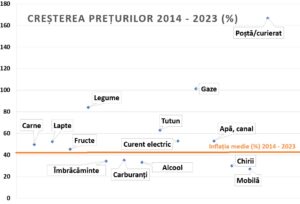 The Constitutional Court upheld on Tuesday two of the four exceptions of unconstitutionality discussed, said CCR President, Valer DORNEANU, quoted by Mediafax.
The Constitutional Court upheld on Tuesday two of the four exceptions of unconstitutionality discussed, said CCR President, Valer DORNEANU, quoted by Mediafax.
These are only the exceptions raised in 25 complaints registered by CCR and the discussion is to resume on October 27 on the exceptions raised in the other 8 cases of the group of 33 already existing on the Court’s agenda.
In total, banks have filed 471 complaints on this law.
The first exception upheld:
„Basically, we upheld the exception of unconstitutionality; it was found that the phrase << also from the devaluation of the immovable property>> that was contained in art. 11 thesis I is unconstitutional.
The phrase refers to the fact that the provisions are also applicable to those situations concerning the devaluation of the immovable property. The lawsuit was about the contract payment, not about immovable property and from this point of view we will eliminate this phrase, „said Valer Dorneanu.
The decision on the unconstitutionality of the phrase „and the devaluation of immovable property” from art. 11, thesis I of Law no.77 / 2016 envisaged that the devaluation of the immovable property is not incidental in relation to the object of the credit agreements (amounts of money), explained CCR, in a release.
The second exception upheld:
„We have also upheld the exception of unconstitutionality and found that the provisions of art. 11 thesis I, in relation to art. 3, thesis II, art. 4, art. 7 and art. 8 of Law no. 77 are constitutional insofar as the court verifies the conditions for the existence of unforeseeability.
I make the mention the courts notified by the banks or other parties did not have this possibility and henceforth the courts will have to consider all the implications of the hardship theory, about the risks and proportionality and other issues,” said Valer Dorneanu, quoted by Mediafax.
The Constitutional Court’s solution considered mainly the violation of article 1, paragraph. (5) on the quality of the law regarding the requirements of clarity and predictability of the law and art. 21 – Free access to justice, from the Constitution.
The Court rejected:
- CCR rejected as inadmissible, the exception of unconstitutionality of the provisions of art. 11, first thesis in relation to the provisions of art. 3, thesis I, as well as the exception of unconstitutionality of the provisions of art.11, second thesis of Law no.77 / 2016 on the debt-to-equity swap for the extinction of debts arising out of loans.
Rejection of this exception as inadmissible took into account the fact that all cases in which the exceptions of unconstitutionality were raised concern loan agreements concluded between 2007-2009, namely under the Civil Code of 1864, so that these provisions are not related to the settlement of the cases, as article 29 paragraph (1) of the Law no.47 / 1992 on the organization and functioning of the Constitutional Court is incident.
- The Court also rejected as unfounded, the exception of unconstitutionality of the provisions of article 11, thesis I relative to the other provisions of Law No.77 / 2016 on debt-to-equity swap of the immovable property for the extinction of debts arising from loans, and found that these provisions are constitutional by reference to the complaints.
So far, there were 273 debt-to-equity swap cases concluded, of about 3,900 notifications sent to banks, according to the financial institutions.
President Klaus Johannis promulgated in April the debt-to-equity swap law, saying that he was satisfied with the revised project. „The Parliament has considered the objections raised in the review request, amended the law accordingly and sent it to me. I appreciate that the Parliament has taken account of my observations and I believe that the law in its current form is okay. Accordingly, I have promulgated the law and it will be published today in the Official Gazette,” said the President then.
The Chamber of Deputies passed the law with some amendments made after Klaus Johannis sent it for revision.
The changes from the final form:
- the Law on debt-to-equity swap will not apply to the First House program
- the provisions of the legislative act will benefit only those borrowers with loans of less than 250,000 euros.
The law allows those who took a loan to purchase a house or land on which to build a home to discontinue it by the debt-to-equity swap procedure. This will also apply to persons who are currently under an enforcement procedure initiated by banks.
The National Bank of Romania (BNR) identified for the first time in history, in the Financial Stability Report presented in April, a severe systemic risk, namely the uncertain legislative framework in the field of banking.
The Governor of the central bank said that the severe systemic risk is caused by the fact that the legislative initiatives seek to retroactively interfere in the contracts between banks and clients. The most significant act in this regard is the Law on debt-to-equity swap which will apply, although amended during the review to the current form, to the entire loan portfolio.
Several international institutions, including the Central European Bank, the European Commission and the International Monetary Fund expressed concerns regarding this draft legislation.









